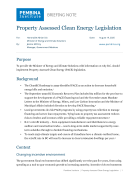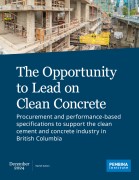The Royal Architectural Institute of Canada, the Urban Development Institute Pacific Region, and the Pembina Institute initiated the following call for action on energy and climate in the building sector.
We support the B.C. government’s commitment to implement a new Climate Plan.
We expect the plan will include ambitious new actions that lead to:
- a strong economy with opportunities for all British Columbians
- a province powered by clean energy
- a more equitable society
- cleaner air and water supporting healthy communities and ecosystems
- protection from a changing climate.
We can’t afford to delay. Now is the time to lead the transition to a clean energy economy.
In this transition, the built environment offers unique opportunities for carbon reductions and economic growth.
As energy and building professionals, trades and businesses, we provide world class products and services to meet customer needs, satisfy regulations and compete in the global marketplace. We are employers, taxpayers, community partners, and leaders in our field.
As local governments, we are committed to the sustainability of our communities. We engage our citizens and staff to reduce emissions, we foster local economic development, and we prepare for a changing climate.
Together, we are ready to transition to a resilient and efficient building sector. We call on the B.C. government to:
- Set a clear target for the end performance goal for new buildings — for example, for new buildings to be net-zero energy ready by 2030 — and work with stakeholders to develop, within six months of the release of the Plan, a roadmap clarifying the timeline and approach to meet this goal
- Lead by example by requiring that all new planned public buildings meet this goal starting in 2016, and by setting up an aggressive renovation program for existing public buildings to reduce their carbon emissions by half in the next decade
- Launch a multi-year incentive program to accelerate market transformation for high performance new construction and deep retrofits, prioritizing affordable housing and high visibility projects
- Develop financing mechanisms to redistribute incremental costs, e.g. financing through property taxes or utility bills, or loans to strata
- Ensure the construction and real estate industry, the government and the public have access to energy performance data to monitor progress and provide feedback on policies and behaviour
- Support integrated land use and transportation planning to encourage location efficient development
- Strengthen the price signal for efficiency and conservation through rates and carbon pricing.
- Support local governments and resource the Building Safety and Standards Branch to facilitate code changes, streamline approval of innovative solutions through variances or alternative solutions, decrease permitting times and increase code compliance.
By pursuing these opportunities, we can reduce our carbon footprint while saving money, creating local jobs, and opening export markets for B.C.-made components and designs. We can also ensure all British Columbians live and work in buildings that improve community health, happiness, and productivity.
This joint statement builds on the Call for Action on Energy and Climate, which is also endorsed by some of these signatories.
Signatories:







